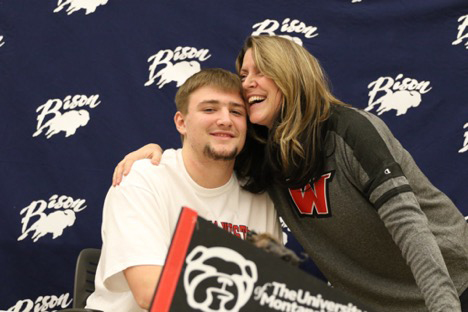The Construction Foreman Parent: 5 Strategies for Raising a Kind and Humble Child
1/8/2019

This picture is worth 1,000 words and it tells a story. A story of a child's hard work with football…signing day! Our son recently signed a letter of intent to play football for University of Montana Western. There is a back story to this picture that I would like to tell…one of a mother's love for her son and her enduring job of teaching him to be kind and humble.
When my wife and I reflect on raising our two grown sons, we are most proud about their humbleness and ability to show kindness. Now, we can't take all the credit for these attributes, but we have worked to raise our sons in such a way as to encourage these character traits using some common mantras, positive specific praise, and by keeping them connected with like-minded people. We believe the ability to have humility and be kind are the greatest characteristics we can teach our kids. We also believe if they can understand and permeate these qualities in everything they do, it will take them far in their endeavors in their jobs, relationships, and life in general.
A recent article that blazed the Internet this past year called parents who mow down all obstacles for their children, "Lawnmower Parents." My article is not about a set of parents that mows down obstacles and hurdles for their kids. This article gives parents five strategies in order to create a foundation where your child can become an empowered and empathetic problem solver with recognizable traits of "humbleness and kindness."
Unlike the "Lawnmower Parent," I would like to coin the phrase, "Construction Foreman Parent." Though it doesn't roll of your tongue like the former, the "Construction Foreman Parent" helps orchestrate how the child will be built (Let's call them the "CF Parent" from here on out). The CF Parent makes sure the concrete foundation and footings are developed to the best their ability. They help define the beams that will be connected to the foundation, as well as give students the tools they need to continue building themselves. The CF Parent also makes sure the student has access to people, places, and strategies in order to support themselves when going through difficult transitions, situations, and even trauma. The CF parent does not mow down obstacles for their child, but rather makes sure they have the tools and strategies to problem solve on their own.
First, let's define humbleness and kindness in terms that we can understand, as well as give some rationale for their importance in teaching children.
Being humble means showing modesty and lowering one's own self-importance, as well as modest pretentions. The ability for a young adult to project humbleness, especially in this day-in-age of instant self-gratification, can be difficult. We believe it is one of the great attributes we can teach our children.
Being kind means being friendly, considerate, and generous. We like the more active term of not just being kind but showing and acting on kindness. What does that look like? Supporting family, friends, community members, and even strangers with everything from actual physical tasks to simple gestures that offer emotional support to those who need it. Kindness is best seen when no one is watching. Teaching kindness doesn't cost a dime, nor should we expect something in return. With the culmination of social media and the current mainstream emphasis on selling negative news stories in society, kindness in action seems rare. We believe this makes these values all the more important to teach our children.
Let's look at these five different strategies in order to create a strong foundation that cultivates humbleness and kindness.

1 - Parents Who Teach, Model, Monitor, and Reflect
We believe the number one teachers of children should be parents and guardians. If you believe in the following teaching mantra, "What you allow is what you permit," then you will understand that there is a multitude of teaching opportunities.
Teaching humbleness and kindness is abstract. As parents, we must make them more tangible. This is where modeling comes into play. We can model kindness to our children by showing it to them through deliberate acts. The most powerful strategy is setting aside time each day or week to serve others. By volunteering our time, we are putting someone else's needs above ours - humbleness as defined above.
We can volunteer at the local rescue mission, Salvation Army, or even United Way. We can also model how kindness can be done randomly or spontaneously. Holding the door for someone else, picking up something that has been dropped, paying it forward by purchasing a meal for someone are all ideas we can use to model spontaneous kindness.
Modeling and teaching should consist of a two directional conversation. Getting feedback from our children while we are modeling kindness is important. Building the rationale on why "we as a family" believe in what we are doing can lead to powerful character builders.
After we teach, we then monitor the results of our instruction. If your child is finding opportunities to show kindness and humbleness? Is it planned, spontaneous, or a combination of both? When dealing with adversity, anxiety, or trauma, does your child understand the power of kindness and humbleness, and is it visible when no one is watching?
Lastly, the ability to reflect and give feedback is an effective teaching strategy a parent can put to use with their child. The power of reflection and implementing ideas, words, and actions creates a cycle that can be replicated, until it is automatic.

2 - Beliefs Mantra Matters
Whether you are a religious person or not, what you believe in permeates out with what your children believe and say. In my household, we have meshed Catholicism with my protestant Methodist beliefs. Years ago, this may have been a deal breaker before an offer of marriage, but now it's commonplace. One strategy a parent can utilize is to teach family beliefs as a way to make sense of the world.
Even if your family is not religious, there should be some ideals, morals, and beliefs that your family has that you can teach as a parent. Humility and kindness can and should be two such characteristics that are taught to children. In fact, many religions talk specifically to these in their scriptures, writings, lessons, etc. You can research the writings of your religion, or you may already know of these passages.
No matter what you do or do not believe in, creating a mantra to use with your children and connecting it to what you practice in life can be powerful. Mantras such as the following sayings, which are not necessarily based on religion, might be a good place to start:
- "Find kindness in others daily."
- "Put yourself in someone else's shoes before you judge."
- "Kill them with kindness."
- "Don't be afraid to eat humble pie, as it is best served warm."
- "Success is not a good teacher. Failure makes you humble."
- "A warm smile is the universal sign of kindness."
(sourced from www.brainyquote.com).

3 - Connect with Strong Teachers and Leaders
As a parent (and someone who can influence others in your immediate family), you must understand that you can not raise your child alone. The saying, "it takes a village," is never more important a concept than when placing your child in some else's care or expertise. Starting at age five or six your child will be with someone else for over 1,000 hours a year at school, reducing your time to under 7,000 possible hours. This is a big change for many parents, but hopefully you have built a foundation that sets your child up for success before they enter school. If not, it is never too late to start building.
Many of us do not have a choice of where our children will attend school, either due to financial concerns or lack of options. The school where you are sending your child for 1,000+ hours a year matters, but not as much as the relationship you as a parent have with administration, teachers, and support staff. Understand we are promoting partnership and teamwork with your child, not a brown-nose mow-down-obstacles type of relationship.
Here is a list of ideas we recommend when teaming with teachers and leaders in your child's school:
- Volunteering time reading, doing math, getting materials ready for teachers, etc.
- Teaming up with PTA to support projects
- Supporting your child at home with homework and some structured work time
- Promoting the schoolwide programs
- Helping to celebrate employees
- Working with leadership to connect with business and community partners
As parents, we want to surround our children with the best teachers possible, as well as the best resources and opportunities. When problems occur, such as a teacher that doesn't like or support your child, what will you do? Perfect time to teach, model, and reflect on how to be kind and humble. We recommend starting to resolve issues by empowering your child to talk to the teacher first. Second, if that is not working, set up a meeting with the teacher. Many problems are solved at this lowest level, first. Next, if after a couple meetings with the teacher, and the results are not productive, it may be time to contact the principal. After meetings with the principal are not fruitful, a change may be in order…change teachers, change classes, or even change schools. A student can recover from one difficult teacher, but several teachers in a row may be damaging to a child's development.

4 - Connect with Strong Coaches and Mentors
Many children grow up playing sports and we rely on others to coach our children. We can team with coaches and mentors to help in the development of our children. Instead of tearing down a coach that we see so often, think about how we can support this coach in helping our children develop. Sports have led to many positive results in a children's development. Sportsmanship, competition, teamwork, work ethic, and many other positive character traits can be developed. This is another ideal time to teach kindness and humility.
In football, we have always taught our sons to work hard, compete, and if you knock someone down, offer them a hand back up. Though nothing may upset an opponent more than offering a hand up, this type of sportsmanship and character seem to be nonexistent in our current sports-crazed world.
We can support our coaches and mentors in many ways. Here are a few ideas we recommend:
- Help organize or donate needed materials
- Support the coach with communication to other parents
- Fundraise to support the team
- Support the coach's views on playing time, fairness, equity, etc.
- When there are problems, teach your child to talk with the coach first before you go to the coach yourself (empower your child with the words they can use to advocate for themselves)
- If there are still problems, wait to address issues with the coach until practice time, not after or before a game
- Cheer for your team and coach, and not against an opponent

5 - Connect to Opportunities in the Community to Serve Others
The importance of serving gives your child a larger feeling of doing good for someone else. Raising a great leader means serving others. The servant leadership concept, as described by Jon Gordon, is powerful. My favorite quote from Gordon states, "You don't have be great to serve, but you have to serve to be great."
Finding ways for your child to serve and connect with the community may seem overwhelming for them and you. Start small! Doing service projects in your church is a great place to start. Many children are part of Boys and Girl Scouts, which can offer other great places to start. Rescue missions, homeless shelters, daycares, schools, food pantries are more places to offer your time to serve.
If you think of your child's time like a pie, what portion of their time is spent doing school work, sports, activities, family time, reading time, fun time, or even down time? How about service work? One of the best ways a parent can teach kindness and humbleness is to teach them to give their time to someone else…not for money or rewards, but because that is "who we are as a family." We donate money routinely to causes, but we also donate time to supporting and helping others. As we serve, we feel good about the impact we are making, and feel good about how we chose to spend our time. We always talk about if we were ever between a rock and hard place, we would want someone to support us…a hand up, and not necessarily a handout!
- Learning How to Say No and Set Boundaries with Parents - November 21, 2022
- If You Had Only One Behavior Strategy to Use in Your Classroom, What Would It Be? - September 26, 2022
- Live Your Code: 7 Strategies That Will Help You Be the Most Effective Educator You Can Be - August 15, 2022










